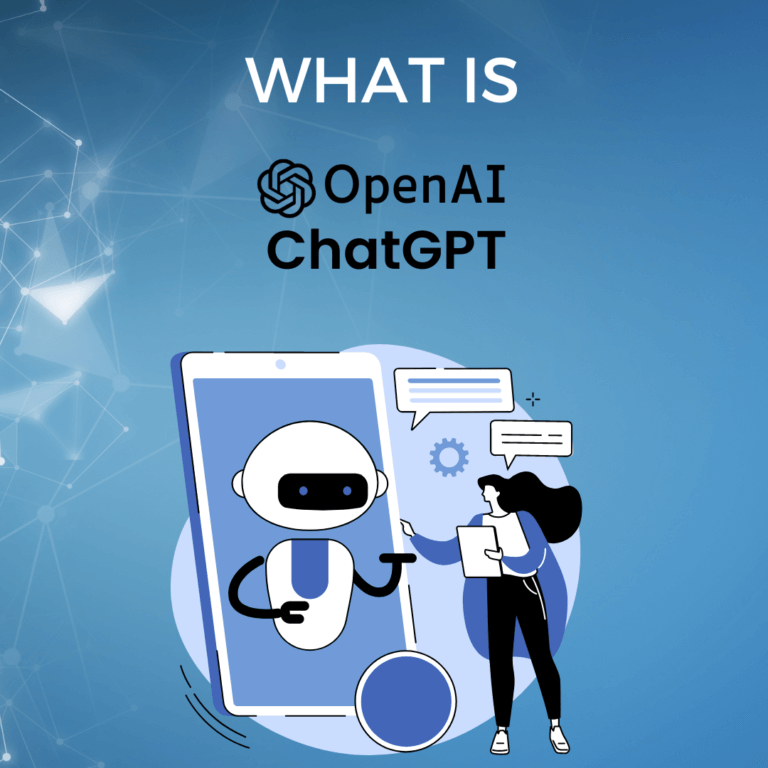Is chatGPT the next big thing in the world of AI?
We enjoy a good technological trend. From Spotify to Netflix to the AI portraits that went viral on social media, we want to know what everyone is talking about. ChatGPT is the most recent technology to take the internet by storm. It is a revolutionary new tool that has gotten a lot of attention since its release late last year. This AI chatbot has become the talk of the town due to its ability to answer almost any or all questions a human can ask. Depending on the prompt of user inputs, this AI chatbot generates responses. Users are using ChatGPT for everything from homework assistance to poetry writing. Furthermore, the responses are very similar to those of a human being. Some see ChatGPT as a direct threat to Google’s $149 billion search engine business, in which Google has long been the dominant player. Is it smart enough to take on Google’s search engine dominance in the near future? Let us investigate.
What is ChatGPT?

ChatGPT is a chatbot that can assist with discussion, customer service, and information collecting. Through the combination of GPT-3 technology and natural language processing, it provides responses that can customize to the user’s input. It is a large-scale language model that trains on a wide variety of internet text, allowing it to generate human-like responses to a wide range of questions and prompts.
ChatGPT can use for various applications such as chatbots, question-answering systems, and language translation. It has an impressive ability to understand context, generate coherent and diverse responses, and even handle some questions that require creativity and critical thinking. The model has been fine-tuned for conversational purposes, making it particularly well-suited for building chatbots and other conversational applications.
How does ChatGPT work?
Chatbots have been around for years, and you might know them best from interacting with any customer service executive over text message; often, that’s a chatbot. Not all chatbots use AI in the same way that ChatGPT does. Some chatbots simply generate responses based on keywords, which may or may not be beneficial. ChatGPT is a large language model based on GPT3 and GPT 3.5. This AI application employs machine learning techniques on a large corpus of text to respond to user queries in a surprising human-like manner. OpenAI claims that ChatGPT improves its capabilities through reinforcement learning, which is dependent on human feedback.
The input to the model is a sequence of text, and the output is a probability distribution over the possible next words. The model uses this information to generate a response to a given prompt, by sampling from the distribution and choosing the most likely next word. This process is repeated until the generated text reaches a certain length or a stop token is generated. The model has been trained on a diverse range of internet text, which gives it a broad understanding of language and knowledge about the world.
Human AI trainers are used to interact with the model while acting as both a user and a chatbot. To promote human-like conversational techniques, trainers evaluate the quality of ChatGPT responses by comparing them to human replies. However, it is important to note that the model has some limitations, including biases in the training data and a tendency to generate safe and generic answers.
What are the limitations of ChatGPT?
Like all language models, ChatGPT has several limitations, including:
1. Lack of Common Sense
ChatGPT has been trained on a vast amount of text data, but it lacks true understanding and common sense. It may struggle to answer questions that require understanding of the world and how it works, such as questions about causal relationships or human emotions.
2. Bias in the Training Data
It has been trained on a large dataset of internet text, which reflects the biases and societal norms present in that data. As a result, ChatGPT may generate incorrect or offensive responses, particularly with regards to gender, race, and other sensitive topics.
3. Lack of Context Awareness
ChatGPT generates responses depending on the prompt it is given, but it does not have any memory or context of previous interactions. This means that it cannot keep track of conversations or maintain coherence over a longer exchange.
4. Safety Concerns
It generates text depending on patterns it has seen in its training data, which means that ChatGPT may generate inappropriate or harmful content. This highlights the need for responsible development and deployment of language models in real-world applications.
Despite these limitations, ChatGPT and other language models are still powerful tools with many potential applications, and ongoing research aims at improving their capabilities and addressing their limitations.
Google Bard vs ChatGPT

Since the impressive capabilities of the conversational artificial intelligence (AI) ChatGPT took the world by storm, all eyes have been on Google to see how the tech giant would respond to this obvious competitor to its dominance over search. ChatGPT became a sensation due to AI content, and Google releases Bard, an AI bot. ChatGPT and Bard may perform similar functions, but they are not the same. You may be wondering which of these two is superior. Right? The simple answer is that it is too early to predict. However, if we have to use a report card to choose between the two, we can say that Google Bard may come out on top over time.
Can ChatGPT Replace Google?
It’s not an easy task for ChatGPT to replace Google in the near future as there are many differences between a chatbot and a Search Engine. Google is a comprehensive search engine and information organization platform, offering a wide range of services beyond answering questions, such as email, cloud storage, online advertisements, maps, and more. ChatGPT on the other hand is a language model, which trains to generate text depending on the input it receives. It can answer questions, generate creative writing, summarize long texts, translate languages, and perform other language-related tasks.
However, it is not capable of performing the functions of a full-fledged search engine like Google. In short, while ChatGPT is a powerful tool for natural language processing, it is not design to replace Google or any other comprehensive search engine.
If you would like to go digital with your business, we can help you with:
• Web Application Development
• Progressive Web Application development
• Mobile Application Development
• Application Maintenance
• Technology and Database Migration services
• Software Consultation
